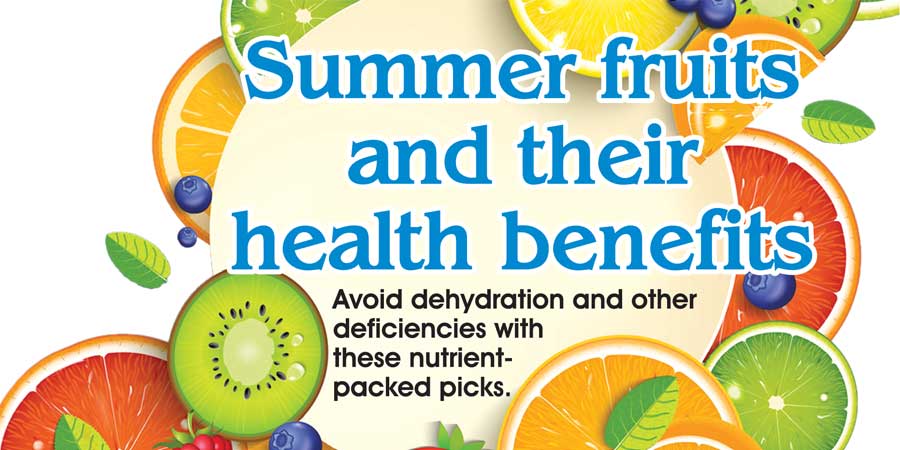Salt therapy – All you need to know
- 24 Feb - 01 Mar, 2024
You know summer's the perfect time to switch to flip-flops, but did you know it's also the right time to change your diet? Being outdoors more often – and sweating – ups your risk for health problems such as dehydration, skin sensitivities, and vitamin and mineral deficiencies. The simple (and delicious) solution? Eat local, in-season fruits. Their nutrients are at their peak in the summer. Read on to see which summer fruits you should be incorporating in your healthy diet.

As its name implies, this fruit is a hydration hero, and fluids are exactly what you need when the heat is on. Watermelon's high water content keeps you cool and hydrated. That same high water content will also keep you feeling full, which could curb cravings. As an added summer bonus, watermelon also contains lycopene, which protects skin cells from sun damage.
The sweet citrus fruit is rich in potassium, a nutrient that's crucial in the summer. You lose potassium through sweat, which puts you at risk for muscle cramps. Eating oranges replenishes your supply and keeps muscle cramps away. Oranges are also about 80 per cent water, so popping a few juicy slices will keep you hydrated during your sweatiest summer days.
These berries are great sources of fibre. Raspberries are a food that goes unnoticed a lot – they can be very expensive off-season – but there are a lot of awesome qualities in the powerful little raspberry. They're very high in vitamin C and have eight grams of fiber per cup.
Fresh or dried, nectarines are a solid source of dietary fibre. Both nectarines and apricots are rich in vitamin A and the antioxidant betacarotene, while peaches contain plenty of vitamin C.
Sweet, juicy berries are filled with flavonoids, powerful disease fighters found in many fruits and vegetables. Among their other pros, they increase blood flow to skin and decrease sensitivity to light, which improves skin's appearance, structure and texture. With more daylight hours and time spent in the sun, that's key. And because berries are so high in flavonoids, one recent study showed they might help slow cognitive decline.
There are so many people out there who love summers just because of mangoes. Mangoes, though high in calories, are a rich source of nutrients. There are reasons why mangoes are known as the ‘king of fruits’. This fruit is enriched with fibre and has as many as 20 minerals and vitamins. Fibre helps with digestion and helps keep you full. Mangoes are rich in Vitamin A and C, and also potassium. Also, zeaxanthin, a pigment present in mangoes, protects the eyes by filtering out harmful blue rays.
Another great fruit that you can eat during summers is papaya. You can eat this fruit dried, ripe or unripe. Papayas contain nutrients like Vitamin A and C, folate, and various phytochemicals. This fruit also contains papain, a compound that is good for your gastrointestinal health. It also helps in curing indigestion and bloating, something that is common during summers. Papaya is also a good source of beta-carotene. It prevents skin damage and reduces inflammation. Papaya also has a decent amount of antioxidants and helps prevent cancer and serious heart diseases. It is a great choice for someone who is on a weight-loss diet.
Plums are rich in nutrients. These round-shaped fruits are rich in dietary fibre and sorbitol which work together to help relieve constipation and other digestive problems. Plums keep the heart healthy by maintaining blood pressure levels and preventing strokes. Consuming plums reduce the risk of breast cancer and type-2 diabetes. Anthocyanins help fight breast cancer. Plums also have a low glycemic index which means you can eat plums while dieting.
Lychees are loved for their sweet and juicy taste. Lychee and mango are the two fruits that you get only during the summer. Try and make good utilisation of both the fruits during the summer season. Lychees are a great source of potassium, polyphenols, and vitamins. They help regular blood pressure and sodium levels. Rich in antioxidants, lychees also boost immunity, prevents cancer, and reduce inflammation.
Grapes are fruits that are easily available in summer. They are high in antioxidants and are a rich source of potassium. Include grapes in your diet if you have high cholesterol or blood sugar. Grapes will keep your heart healthy. They are good for the knees and boost brain health. Grapes also prevent many viral infections and prevent eye degeneration. They cure indigestion and help fight breast cancer.
COMMENTS